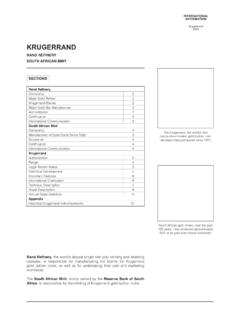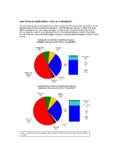Transcription of THE LABOUR COURT OF SOUTH AFRICA, …
1 REPUBLIC OF SOUTH africa Not reportable Of interest to other judges THE LABOUR COURT OF SOUTH africa , JOHANNESBURG JUDGMENT Case no: JR 2498/13 In the matter between: Micheline PRETORIUS Applicant and G4S SECURE SOLUTIONS (SA) (PTY) LTD First Respondent Themba HLATSWAYO Second Respondent CCMA Third Respondent Heard: 29 October 2015 Delivered: 24 November 2015 Summary: Review ULP demotion LRA s 186(2)(a). JUDGMENT STEENKAMP J Page 2 Introduction [1] The applicant, Ms Michelene Pretorius, was employed as a security officer by G4S at the rand refinery site. She earned R12 000 per month. As a result of her alleged negligence G4S redeployed her to another site, resulting in a reduction of her monthly salary to R 3 872. She referred an unfair LABOUR practice claim to the CCMA. The arbitrator (the second respondent) found that the actions of G4S did not fall within the meaning of unfair LABOUR practice. He dismissed her claim.
2 She seeks to review that finding. Background facts [2] The employee was a grade A security The first respondent, G4S, placed her at the site of rand refinery . G4S paid her R 12 000 per month. Her contract of employment stated: The employee s basic salary specifically for rand refinery shall be R 12 000, 00. And, in an addendum: It is specifically recorded that the parties agree that: Pretorius has been employed to a specific site namely rand refinery in the capacity of grade A security officer. For the duration of the period that Pretorius remains at rand refinery in the capacity of grade A security officer she will and a fixed gross monthly salary of R 12000, 00. This is only applicable for the period Pretorius works in the capacity of grade A at rand refinery and falls away immediately should Pretorius be posted to any other G4S client service contract for any reason whatsoever including but not limited to those listed below that: the client request [sic] that the employee be transferred from the site for any reason whatsoever; in the event of G4S losing the service contract; 1 Subsequent to this dispute, she was dismissed for operational requirements.
3 That dismissal does not form part of this application. Page 3 a reduction of the manpower requirements at rand refinery ; a transfer to another site in accordance with company policies and procedures. All other conditions of employment as set out in your contract of employment shall remain in force and fully binding on both you and the company. [3] The employee allegedly lost a set of keys. It is also alleged that she falsely claimed that she had handed the keys over to another security officer. rand refinery demanded that she be removed from its site. G4S redeployed to another site and issued her with a final written warning valid for six months. As a result of her redeployment, she no longer earned R12 000 per month but reverted to the minimum grade A salary prescribed in the sectoral determination of the private security sector which was almost two thirds less, viz R 3 872. [4] The employee referred an unfair LABOUR practice dispute to the CCMA.
4 It was conciliated but remained unresolved. She referred it for arbitration. The primary issue was reflected as: s 186(2)(a) - unfair conduct promotion/demotion/probation/training/be nefits . The award [5] The arbitrator initially correctly identified the dispute as relating to an unfair LABOUR practice. He briefly summarised the evidence of the respective parties. He then phrased the question before him thus: Foremost, let me deal with whether or not the act of removal of the applicant from rand refinery site falls within the meaning of unfair LABOUR practice. [6] Although the arbitrator noted that he had been referred by the employee s attorney to the LABOUR Appeal COURT judgement in Apollo Tyres2, he did not discuss the question whether the employee had acquired a benefit as 2 Apparently a reference to Apollo Tyres SA (Pty) Ltd v CCMA [2013] 5 BLLR 434 (LAC); (2013) 34 ILJ 1120 (LAC), although the arbitrator did not provide any citation.
5 Page 4 envisaged in s 186(2)(a) of the LRA3 any further, other than blithely stating his disagreement with higher authority: I do not share the idea that the LABOUR Appeal COURT ruled that the term benefit will necessarily include remuneration. The LABOUR Appeal COURT had, on the contrary, drawn a distinct basis on which benefit will be interpreted to be over and above the normal remuneration. [7] The arbitrator also did not consider whether the reduction in salary amounted to a demotion. [8] Instead, the arbitrator accepted that the employer has a prerogative to deployed employees on different sites based on its operational requirements (although it was common cause that the employee had been removed due to her alleged misconduct). He further found that the employee was advised why she was being removed; that the removal from site was inextricably linked to the adjustment of salary ; and that there was therefore no need for the [company] to engage the applicant in terms of a formal enquiry.
6 On the basis of the employer s prerogative, he then simply found that its actions do not therefore fall within the meaning of unfair LABOUR practice as envisaged by section 186(2)(a) of the LRA. [9] After expressing his disagreement with the finding of the LAC in Apollo Tyres, the arbitrator concluded: Given the submissions made before me, I conclude on a balance of probabilities that the respondent s actions do not fall within the meaning of unfair LABOUR practice. Review grounds [10] Mr Roets argued that the conclusion of the arbitrator was so unreasonable that no other arbitrator could have come to the same conclusion. The main thrust of his argument concentrated on the question of demotion, although, as I understood it, he did not abandon the question of whether the employee had been deprived of a benefit, thus constituting an unfair LABOUR practice. 3 LABOUR Relations Act 66 of 1995.
7 Page 5 Evaluation / Analysis [11] It may seem at first blush that the arbitrator s ruling is a jurisdictional one, and that the reasonableness test does not apply on review. As the LAC reiterated in Apollo Tyres4: The COURT a quo however found that the second respondent s ruling that the scheme was a benefit that falls within the purview of section 186 (2) (a) of the LABOUR Relations Act 66 of 1995 (the Act) is a decision that fell within the band of reasonableness. The COURT a quo further said that the debate about which of the decisions of this COURT is (sic) correct or is to be preferred on what constitutes benefits as is embarked upon by the applicant belongs to an appeal and not a review . In my view, the COURT a quo misinterpreted the appellant s argument. The argument was that the CCMA does not have jurisdiction to adjudicate the dispute because the scheme is not a benefit as contemplated in Section 186 (2) (a) of the Act. The question is therefore not whether the second respondent acted reasonably or reached a conclusion that a reasonable commissioner could not reach but whether his finding is wrong or right.
8 Put differently the enquiry ought to be whether the second respondent was correct in ruling that the CCMA had jurisdiction to adjudicate the dispute. See City of Cape Town v SAMWU obo Jacobs and [12] But in this case, the commissioner correctly assumed that he had to decide whether or not G4S had committed an unfair LABOUR practice. Although he decided that it had not, that conclusion was not a jurisdictional one, but a conclusion on the merits (whether right or wrong). The test on review remains, therefore, the reasonableness test set out in Sidumo6 and subsequent authorities. Unfair LABOUR practice: LRA s 186(1) (a) Section 186 (2) (a) of the Act reads as follows: Unfair LABOUR practice means any unfair act or omission that arises between an employer and an employee involving- 4 Supra para [17]. 5 [2009] 9 BLLR 882 (LAC) at paragraph 28. 6 Sidumo v Rustenburg Platinum Mines Ltd [2007] 12 BLLR 1097 (CC).
9 Page 6 Unfair conduct by the employer relating to the promotion, demotion, probation (excluding disputes about dismissals for a reason relating to probation) or training of an employee or relating to the provision of benefits to an employee; Demotion? [13] Mr Roets argued that the arbitrator never considered whether the redeployment of the employee from rand refinery amounted to a demotion. There is merit in that argument. [14] It is common cause that the employee s salariy was reduced by two thirds as a result of her redeployment. A reduction in salary can be a demotion, although it does not always necessarily follow. And even without a reduction in salary, a transfer may in itself constitute a Yet the commissioner never even considered this possibility. Instead, he simply assumed that it was the employer s prerogative to redeploy her at the insistence of rand refinery . [15] Similar contracts relating to the dismissal as opposed to the redeployment of employees at the insistence of a client have been held to be invalid by this COURT .
10 In Mahlamu v CCMA8 Van Niekerk J held: In short: a contractual device that renders a termination of a contract of employment to be something other than a dismissal, with the result that the employee is denied the right to challenge the fairness thereof in terms of section 188 of the LRA, is precisely the mischief that section 5 of the Act prohibits. Secondly, a contractual term to this effect does not fall within the exclusion in section 5(4), because contracting out of the right not to be unfairly dismissed is not permitted by the Act. This is not to say that there is a dismissal for the purposes of s 186(1) of the LRA in those cases where the end of an agreed fixed term is defined by the occurrence of a particular 7 Cf Nxele v Chief Deputy Commissioner, Corporate Services, Department of Correctional Services [2008] 12 BLLR 1179 (LAC) para [88] (per Zondo JP); SAPS v Salukazana [2010] 7 BLLR 764 (LC); (2010) 31 ILJ 2465 (LC).
















